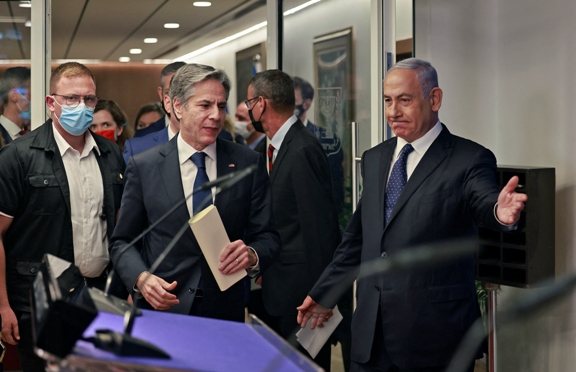Iran talks loom as a new test of Biden’s Israel ties
By Michael Crowley
WASHINGTON — Prime Minister Benjamin Netanyahu of Israel took a moment on Tuesday (25) to thank the Biden administration for its support during his country’s 11-day conflict with Hamas in Gaza — and then abruptly changed the subject, and his tone.
“We discussed many regional issues, but none is greater than Iran,” Netanyahu said, standing with Secretary of State Antony Blinken after their meeting in Jerusalem. He pointedly added that he hoped the United States would not rejoin the 2015 Iran nuclear deal, “because we believe that that deal paves the way for Iran to have an arsenal of nuclear weapons with international legitimacy.”
The Israeli leader’s remarks lent a sour note to his welcome of Blinken. And it undoubtedly echoed a few thousand miles away in Vienna, where a fifth round of negotiations aimed at bringing the United States and Iran back into compliance with the nuclear agreement, a top priority of Biden’s, opened on Tuesday.
As Netanyahu’s remarks made clear, the Gaza conflict appears to have earned Biden good will with the Israeli leader, and his public. But the prospect of a US return to the nuclear deal threatens to generate new strains between Washington and Jerusalem on a subject that poisoned relations between President Barack Obama and Netanyahu.
“The big drama looms, and that is the Iran nuclear deal,” said Jonathan Schanzer, a Middle East expert at the Foundation for Defence of Democracies.
“I think both Biden and Netanyahu realize that whatever discomfort both sides may have felt throughout this current conflict, it is small fries compared to the political friction that is looming,” Schanzer added.
Compounding the trouble is the conflict in Gaza, which has created anger in Israel and among Republicans in Congress over Iran’s ties to Palestinian militants. Most analysts say Iran played no active role in this month’s rocket attacks on Israel from Gaza, even though Tehran openly cheered them on.
But Tehran has for years provided the Gaza-based militant groups Hamas and Palestinian Islamic Jihad with financial and military backing — and, after long-time smuggling tunnels were sealed, taught those groups how to build their own munitions.
Citing that relationship, 44 Senate Republicans signed a letter to Biden this month insisting that he cut off his negotiations with Iran, which they called “a long-time financial and material supporter of Hamas.”
“The United States must not do anything to enrich Israel’s enemies, such as by offering sanctions relief to a regime that seeks to destroy Israel,” the senators wrote.
The nuclear talks, in which the US is negotiating indirectly with Iran, are aimed at bringing the US and Iran back into compliance with the agreement, which was forged by the Obama administration and several other world powers. President Donald Trump withdrew from the deal in 2018 and subsequently hammered Iran with new sanctions, prompting Tehran to disregard the limits it had agreed to on its nuclear program and produce more enriched uranium that is closer to what it would need to fashion a nuclear bomb.
During an online talk hosted by the conservative Hudson Institute in Washington on Friday (21), Ron Dermer, who was Israel’s ambassador to the United States from 2013 until earlier this year, spoke at least as much about Iran as he did about the Palestinians.
Dermer, now a private citizen but still a confidante of Netanyahu’s, said the Biden administration was “engaged in an accommodation of Iran at best, and appeasement of Iran at worst.”
“It’s disastrous for Israel’s national security,” he added.
During his joint appearance with Netanyahu, Blinken said the administration was “consulting closely with Israel, as we did today, on the ongoing negotiations in Vienna around a potential return to the Iran nuclear agreement, at the same time as we continue to work together to counter Iran’s destabilizing actions in the region.”
With a fifth national election in two years possible in Israel, the long-embattled Netanyahu’s days in power may be numbered. But David Makovsky, the director of the Koret Program on Arab-Israel Relations at the Washington Institute for Near East Policy, said he sees no immediate successor to Netanyahu who is more amenable to the nuclear deal.
Makovsky said Israeli officials hope to avoid the acrimony with Washington that characterized Obama’s nuclear talks with Iran. Netanyahu openly denounced the deal as lacking sufficient limits on Iran’s nuclear activity, in part because many restrictions phase out after a decade, and as failing to address Iran’s support of anti-Israel proxies like Hamas and Lebanon-based Hezbollah.
But he added that Israeli officials have grown sceptical of talk from Blinken and other Biden officials about a potential “longer and stronger” deal that would address Iran’s ballistic missile program and support for proxies.
The prospects for a revived nuclear deal not only hinge on negotiations in Vienna, but on electoral politics in Tehran, where a list of seven contenders for the presidential elections next month was announced Tuesday by a panel of clerics that vets the candidates.
Two associates of President Hassan Rouhani, a moderate who was an architect of the original nuclear deal, were disqualified from the final list on Tuesday, virtually guaranteeing that the next president will be a conservative hard-liner closely aligned with the supreme leader, Ayatollah Ali Khamenei. The candidate most favoured to win is Ebrahim Raisi, the head of the judiciary.
While on the surface a hard-liner’s election may not bode well for the nuclear negotiations, it could have the opposite effect and even hasten an agreement before the election, some analysts said. Khamenei, despite his antipathy toward the United States, wants the negotiations on reviving the nuclear deal to succeed but does not want a moderate as the next president.
-New York Times


